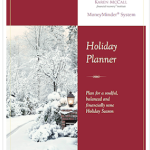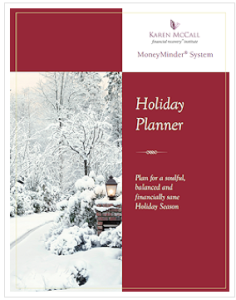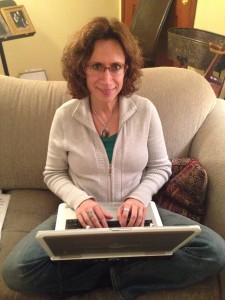Happy Thanksgiving! Listen- as a money coach I know that though the holidays are a joyful time, they can actually bring great stress in our lives. We often struggle to enjoy the season because of expectations and pressures we put upon ourselves. Many of us overspend, and then greet January with an emotional and spending hangover. Take heart! I want to share with you my good friend and MoneyMinder co-founder Karen McCall’s Holiday Planner . It can help you create a holiday season that is balanced and financially sane. Below, Karen shares a part of her powerful process. At the end you can download her free holiday planner. It’s a gift for you.
Best, Mikelann
How to Enjoy the holidays as balanced, within your means and stress free
From Karen McCall:
For years the holidays left me with an emotional and financial hangover. If you can relate, I’d like to share the process that turned this around for me.
The first step to making this holiday season better than previous ones is to examine what worked and what didn’t work with previous seasons. Would you like to do that? It’s not always easy, but let’s give it a try.
Here’s an example. I remember when my children were young that I used to love to buy them lots of presents… even if I couldn’t afford it. I’d start my shopping early when the department stores first started playing the Christmas music and decorating. (Have you noticed that they start this earlier and earlier these days) I would continue to shop throughout the holiday season, sometimes forgetting how many presents I had already purchased. January, when the credit card bills came, was not a pleasant experience.
Yet, when I look back to what my daughters loved the most, more than their gifts, it was the simplest things like Mom not being stressed, family time with games, and just spending time together.
Planning.
Planning what I would spend and then sticking with it.
Remembering.
Remembering that it was the time I spent with my children, like baking cookies, that they loved even more than a new toy.
So now, each year in November, I get out my Holiday Planner and I work the process. Doing this helps me to stay in touch with the holiday season that we as a family want to have: balanced, within our means, and stress free.
To see all the steps and complete planner, you can download your copy here. Holiday Planner
Want more help transforming your relationship to money? Check out all the eBooks, audios, and more robust products Mikelann has created. Are you ready to break free of the “money fog” and step into earning what you are worth? Are you are ready to get in touch with your emotions so you never feel out of control around money again? Are you ready to love your financial life? Let Mikelann help you get there. Free items are at the top of the page.






